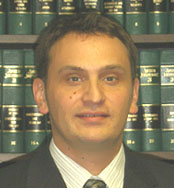

| THE SAINT PAUL PERSONAL INJURY ATTORNEY |
 |
 |
|
VULNERABLE ADULT - Reporting mandated when not an accident or therapeutic conductSTATE OF MINNESOTAIN COURT OF APPEALS A06-1799 In the Matter of the Maltreatment and Disqualification of Margie Kleven. Filed August 7, 2007 Affirmed Kalitowski, Judge Department of Human Services File No. 12-1800-17060-2 Matthew P. Franzese, Traverse County Attorney, Leuthner Law Office, 218 Third Avenue East, Suite 102, Alexandria, MN 56308 (for relator Margie Kleven) Lori Swanson, Attorney General, Jonathan Geffen, Amber Hawkins, Assistant Attorneys General, 900 Bremer Tower, 445 Minnesota Street, St. Paul, MN 55101-2131 (for respondent Commissioner of Human Services) Considered and decided by Minge, Presiding Judge; Kalitowski, Judge; and Klaphake, Judge. S Y L L A B U S The Minnesota Vulnerable Adults Act mandates the reporting of a caregiver’s conduct that “is not an accident or therapeutic conduct . . . which produces or could reasonably be expected to produce physical pain or injury or emotional distress” in a reasonable person. O P I N I O N KALITOWSKI, Judge Relator Margie Kleven challenges a decision by the Minnesota Department of Human Services disqualifying her from being in any position which allowed direct contact with persons served by programs requiring a license under Minn. Stat. §§ 245C.14, subd. 1(a)(3), .15, subd. 4 (2004), based on her treatment of the vulnerable adults under her care. She argues that the department misinterpreted Minn. Stat. § 626.5572, subd. 2(b)(2) (2004), by considering the objective, rather than subjective, effects her conduct had on the vulnerable adults. FACTS Relator Margie Kleven worked as a human services technician in a group home housing for developmentally disabled adult men. The men: [F]unction mentally at about the level of a normal eighteen-month-old child. They cannot communicate verbally. They do not use words to communicate, either oral or written. With very few exceptions related to their daily routine, the clients do not understand words spoken to them. They have some signs and behaviors to indicate some needs. [One man] cannot dress himself and wears an incontinence brief. [The other men] can dress themselves, with prompts. Due to their inability to provide self-care, the clients are assisted with most of their activities of daily living, including bathing, shaving, and meals. The record indicates, and relator does not dispute, that she repeatedly referred both to and about the men as “a--holes” and that she attempted to teach one of the men to say “f-ck you.” Following a department investigation and hearing, an administrative law judge (ALJ) recommended relator’s disqualification from any position which allowed direct contact with persons served by programs requiring a department of human services license under Minn. Stat. §§ 245C.14, subd. 1(a)(3), .15, subd. 4 (2004), based on her treatment of the vulnerable adults under her care. The Commissioner of Human Services affirmed the ALJ’s decision. ISSUE Does the Minnesota Vulnerable Adults Act, Minn. Stat. §§ 626.557, subd. 1, .5572, subd. 2(b)(2) (2004), mandate reporting of a caregiver’s conduct that “is not an accident or therapeutic conduct . . . which produces or could reasonably be expected to produce physical pain or injury or emotional distress” in a reasonable person? ANALYSIS Statutory construction is a question of law, which this court reviews de novo. Brookfield Trade Ctr. v. County of Ramsey, 584 N.W.2d 390, 393 (Minn. 1998). “When construing a statute, our goal is to ascertain and effectuate the intention of the legislature.” Am. Family Ins. Group v. Schroedl, 616 N.W.2d 273, 278 (Minn. 2000). The rules of statutory construction require that a statute’s words and phrases are to be given their plain and ordinary meaning. Minn. Stat. § 645.16 (2004). When reviewing a statute, this court assumes that the legislature does not intend absurd or unreasonable results. Schroedl, 616 N.W.2d at 278. “When interpreting a statute, we first look to see whether the statute’s language, on its face, is clear or ambiguous. A statute is only ambiguous when the language therein is subject to more than one reasonable interpretation.” Id. at 277 (quotation and citation omitted). When the language of the statute is ambiguous, the intent of the legislature controls. Minn. Stat. § 645.16. “A statute should be interpreted, whenever possible, to give effect to all of its provisions; ‘no word, phrase, or sentence should be deemed superfluous, void, or insignificant.’” Schroedl, 616 N.W.2d at 277 (quoting Amaral v. St. Cloud Hosp., 598 N.W.2d 379, 384 (Minn. 1999)). And this court is “to read and construe a statute as a whole and must interpret each section in light of the surrounding sections to avoid conflicting interpretations.” Id. Although this court retains the authority to review de novo administrative interpretations of statutes, an agency’s interpretation of a statute that it administers is entitled to deference. In re Denial of Eller Media Co.’s Applications for Outdoor Adver. Device Permits, 664 N.W.2d 1, 7 (Minn. 2003); In re Univ. of Minn., 566 N.W.2d 98, 103 (Minn. App. 1997). Here, relator challenges the department’s interpretation of a provision of the Minnesota Vulnerable Adults Act. The primary purpose of the Vulnerable Adults Act is to protect vulnerable adults. Minn. Stat. § 626.557, subd. 1 (2004). The act is a remedial statute designed to protect a specific class of individuals, and we interpret the statute in favor of that class. See Smith v. Employers’ Overload Co., 314 N.W.2d 220, 221-22 (Minn. 1981). The provision of the Minnesota Vulnerable Adults Act that relator challenges is the definition of abuse as maltreatment defined in Minn. Stat. § 626.5572, subd. 2(b)(2) (2004): Conduct which is not an accident or therapeutic conduct . . . which produces or could reasonably be expected to produce physical pain or injury or emotional distress including, but not limited to, the following: . . . (2) use of repeated or malicious oral, written, or gestured language toward a vulnerable adult or the treatment of a vulnerable adult which would be considered by a reasonable person to be disparaging, derogatory, humiliating, harassing, or threatening. The ALJ concluded, and the commissioner agreed, that: Appellant’s conduct of attempting to have a vulnerable adult say “f[-]ck you” is abuse . . . because it is conduct involving language toward a vulnerable adult which would be considered by a reasonable person to be disparaging, derogatory, and humiliating. Appellant’s repeated instances of directly calling a vulnerable adult “a[--]hole” is abuse . . . because it is repeated oral language toward a vulnerable adult which would be considered by a reasonable person to be disparaging, derogatory, and humiliating. Relator argues that the department must not only find that her statements were repeated or malicious and that the conduct would be considered by a reasonable person to be offensive, but also that her conduct did or reasonably could cause emotional distress in these four vulnerable adults. Rather than an objective standard, relator interprets the statute to apply a subjective standard of the likelihood of causing “physical pain or injury or emotional distress.” Relator reasons that because the vulnerable adults did not understand what relator was saying, the department could not make a finding that they experienced or could reasonably be expected to experience emotional distress as a result of her statements. We first address whether the statutory language is ambiguous. Schroedl, 616 N.W.2d at 277. The statute does not prescribe a standard to apply when making the initial determination of whether “[c]onduct . . . which produces or could reasonably be expected to produce physical pain . . . or emotional distress” is maltreatment. Minn. Stat. § 626.5572, subd. 2(b). If the conduct does not meet this threshold qualification of the definition of maltreatment, the specific examples of conduct provided, and any standard contained within those subdivisions, are irrelevant. Here, relator suggests that the statute is properly interpreted to apply a subjective standard to the threshold determination because the legislature specifically omitted “reasonable person” language in that provision. Respondent argues that the statute is properly interpreted to apply a reasonable person standard because to do otherwise would lead to absurd results. Because the statute includes a standard with subdivision 2(b)(2) but not within the gate-keeping “conduct” provision, we conclude that the statutory language is subject to more than one reasonable interpretation and is accordingly ambiguous. Therefore, we must examine the legislative intent in adopting the act. Relator’s interpretation of the statute is contrary to the policy of the Vulnerable Adults Act. The act has the stated purpose “to protect adults who, because of physical or mental disability or dependency on institutional services, are particularly vulnerable to maltreatment [and] to assist in providing safe environments for vulnerable adults.” Minn. Stat. § 626.557, subd. 1. As relator admits, application of her interpretation of the statute would mean that the more vulnerable the adult, the worse his caretaker could permissibly treat him. Under relator’s interpretation, this provision of the act results in decreasing protection for increasingly vulnerable adults. Relator’s interpretation is an affront to the purpose of the act and leads to absurd results, which we presume the legislature did not intend. Schroedl, 616 N.W.2d at 278 (stating that “courts should construe a statute to avoid absurd results and unjust consequences”). Given the deference owed to the department’s interpretation, the interpretation’s support of the stated purpose of the statute, the statute’s remedial nature, and the potentially absurd results that relator’s interpretation could present, we conclude that the department did not err in its interpretation of the statute. D E C I S I O N We conclude that the legislature intended that Minn. Stat. §§ 626.557, subd. 1, .5572, subd. 2(b)(2), the Minnesota Vulnerable Adults Act, mandates reporting of a caregiver’s conduct that “is not an accident or therapeutic conduct . . . which produces or could reasonably be expected to produce physical pain or injury or emotional distress” in a reasonable person. Affirmed. |
|||||||||||||||||||||||||||||||||||||||||||||||||||||||||||||||||||||||
| By visiting this page or clicking the "submit" button above, you agree that you have read and accept this "disclaimer". |
||||||||||||||||||||||||||||||||||||||||||||||||||||||||||||||||||||||||
| Copyright ©
Michael E. Douglas, Attorney at Law, Saint Paul MN. All Rights
Reserved. Minnesota Lawyer representing Personal Injury, Car / Auto Accident, Workers Compensation, Medical Malpractice, Social Security Disability claims. Dedicated to Injured Workers, Victims of Negligence, Car Accidents, Victims of Fraud, and those in need of legal assistance. |